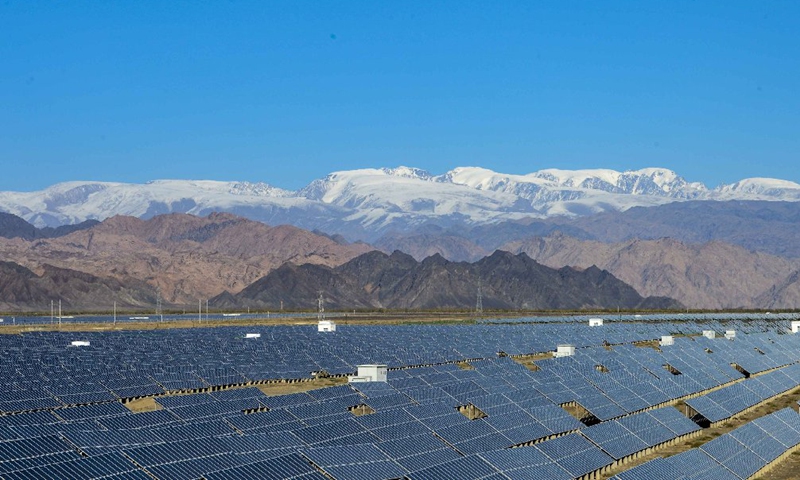
Photo shows a photovoltaic power plant in Hami, northwest China's Xinjiang Uygur Autonomous Region. File photo: Xinhua
One of the vital roles of any sensible government is to expand the horizon for its businesses, but sensible, these days, does not come close to describing the US government, which has evidently set out on an unprecedented mission to ruin US businesses' prospects in the Chinese market.
After unashamedly peddling lies about "forced labor" and "human rights abuses" in Northwest China's Xinjiang Uygur Autonomous Region failing to convince the international community, Washington has evidently shifted gear and resorted to what it does the best: arbitrary sanctions.
US President Joe Biden on Thursday signed into law a legislation that bans imports from Xinjiang, with cotton, tomatoes and certain solar panel components being designated as "high priority."
The bill was passed earlier this month by the US Congress, which has essentially become the assembly line of a litany of manufactured lies and claims against China and a useless swamp only good for bittering partisan and ideological fights when it comes to any US domestic problem. Given his weak standing in the US Congress and hostile approach toward China, Biden's signing the bill into law on Thursday was not only predictable but expected.
Undoubtedly, the US move will spark a new wave of anger among the Chinese public, which is already growing increasingly frustrated by Washington's lack of any decency and respect for the truth. But at the end of the day, nothing the US government say or does can change the remarkable social and economic development in Xinjiang over the years, let alone the Chinese economy.
What the move actually does is to tie the hands of US businesses that have massive interests in the Chinese market. The new US bill, like many before, is aimed at "pushing against" China, but it is US companies that are banned from importing the products, and by extension, it is US consumers who are banned from using those products. Like the US tariffs imposed on Chinese products, the bill will only punish US businesses and consumers.
Xinjiang cotton, tomatoes, solar components and other products will not sit idle and have no market just because of the US bill. It's no exaggeration to say that a market of 1.4 billion consumers will surely be able to consume whatever high-quality products Xinjiang can produce, not to mention the demand of many overseas markets.
But same cannot be said about US businesses, which are increasingly being forced to take a political stance and cut ties with their Chinese business partners they have worked with for years if not decades. Even worse for US firms is the risk of losing the Chinese market, which is the biggest revenue source for many of them, because their pandering to Washington's unreasonable demand will inevitably anger their Chinese consumers.
US chip firm Intel got a taste of that this week, when the company's letter requesting all its suppliers to stop sourcing products and labor from Xinjiang angered the Chinese public. The company has since apologized for causing trouble to its consumers and partners in China, while clarifying the move was only intended to comply with US laws.
Intel's move is particularly vicious because it was the first US major firm to cater to Washington's political demands in such a high-profile manner. Notably, the move came before the new law on Thursday. But Intel's clarification also highlighted a growing risk for other US businesses that they are being forced by US politicians to make a political move, something, in a normal world, that is despised by companies.
Following Intel's case, some Chinese consumers on Friday also reported that US retailer Walmart has removed a number of Xinjiang sourced products from its shelves. The reports are yet to be confirmed and it's unclear whether there was any political consideration involved. But regardless of the nature, if the reports are true, they will certainly prompt backlash from Chinese consumers, even if the companies did it just to "comply with US laws."
Predictably, with the US law now in effect, many US businesses face a more complex and vulnerable position standing between the US government and the Chinese market. But they have to know, it's their government and political leaders that put them there, not the Chinese government or Chinese consumers.




